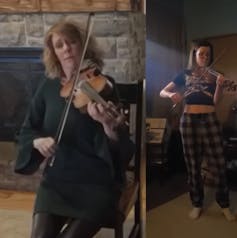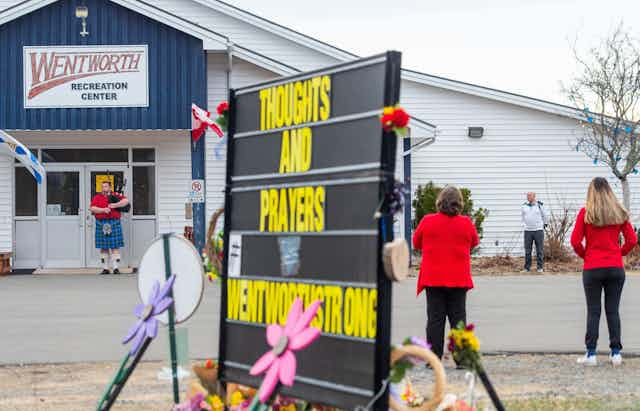Since 22 people in northern Nova Scotia died in Canada’s worst mass shooting, many are turning to music to voice their sorrow and process their grief.
The recent “Nova Scotia Remembers: A Virtual Vigil” included a video edited to show Cape Breton fiddler Natalie MacMaster playing alongside 17-year-old shooting victim Emily Tuck. Earlier, Emily’s father, Aaron Tuck, had posted the video of Emily’s fiddling to the popular Facebook page, Ultimate Online Nova Scotia Kitchen Party (Covid 19 Edition). Both Emily’s parents, Aaron Tuck and Jolene Oliver, were also killed by the shooter.

The virtual vigil was broadcast on television, radio, Facebook and YouTube. The YouTube version alone had more than 60,000 views four days after its April 24 airing.
Jonathan Torrens, host of the vigil and an actor who lives in Colchester County, said that communities would normally come together to share memories, tears and comforting touch. But under coronavirus restrictions, that hasn’t been possible.
As Torrens also said:
“There is a proud tradition in this part of the world: sometimes, when there simply are no words, we turn to song.”
I am in the final stages of writing a book about Atlantic Canadian disaster songs — songs about unintentional, sudden onset disasters such as shipwrecks or mining disasters that occurred in Atlantic Canada, although the songs may have been written by anyone, anywhere. My database consists of more than 500 songs. There is a long history of disaster songs, stretching back hundreds of years to the broadside ballad tradition in the British Isles.
The Nova Scotia shootings were calculated, and thus have left people grappling with questions about evil and meaning. Nevertheless, Canadians are drawing on this long disaster song tradition about sudden onset and unintentional disasters to mourn and comfort.
‘Kitchen’ gathering needed
As the news of the Nova Scotia shootings first became known, people immediately began posting to the Ultimate Online Nova Scotia Kitchen Party (Covid 19 Edition) Facebook page.
This page was was already inadvertently positioned to serve as a virtual memorial site after the shootings. Its identity is Nova Scotian (even though members are from around the world) and its focus is on music, which people wanted to use to express their grief. Finally, it’s virtual and therefore a viable gathering space during the time of coronavirus. For all intents and purposes, it’s serving as an intangible memorial.
Initially, people posted videos of music that reflected their grief or that they found inspirational. Then, contributors began recording themselves performing songs. Some songs offered, like “The Parting Glass,” shared in four-part harmony based on an arrangement by the Wailin’ Jennys, and Daniel Cadigan’s new lyrics set to the traditional melody of “Willie McBride,” were drawn from traditional music of the British Isles.

Other songs were more contemporary, like Sarah McLachlan’s “Angel” and Vince Gill’s “Go Rest High on That Mountain.” And then, within about 48 hours, newly composed songs began to emerge.
I have identified more than a dozen new songs directly written in response to the shootings and I am sure I’ve missed others.
Music and mourning death
Music has always played a role at times of grief, from funeral music to songs about death and sorrow.
But death culture has changed considerably over the course of the 20th century. Bodies and funerals were once managed by families and communities, but now a professional funeral industry exists to handle most aspects of death.
The decline of organized religion and changes in death culture and practices have led people to create new, vernacular forms of memorialization, notably spontaneous memorials.
The importance of memorials
Folklorist Kay Turner has argued that spontaneous memorials began to rise in popularity around 1980, and they proliferated in the wake of 9/11.
Spontaneous memorials are now common after sudden, unexpected and untimely deaths. They typically emerge quickly at a site of symbolic significance, created from objects such as candles, notes, toys and flowers left in tribute by people who feel compelled to do something in response to their grief. Spontaneous memorials typically become places where people come together in sorrow.

My research shows that disaster songwriting has increased in tandem with the rise in spontaneous memorials. And like spontaneous memorials, disaster songs often emerge very quickly after a tragedy. And while songs, unlike spontaneous memorials, are not physically tied to a particular location, the lyrics will often make reference to specific places.
Many sites of significance
While a number of spontaneous memorials have emerged after the Nova Scotia shooting, several factors limit their capacity to speak to the entire events. First is the fact that the shootings took place over such a wide geographical area. There is no single site of significance. And so we find that memorials are springing up in multiple sites.
Also significant is the fact that public health regulations forbid social gatherings and require social distancing. Even if it were possible to gather at a spontaneous memorial site, many people do not live close enough to do so.
At 8 a.m. on April 24, pipers across the province and beyond stood on their front lawns and played “Amazing Grace” in tribute to the shooting victims and in support of their families and friends.
Vernacular music-making, songwriting and song sharing today are significant cultural responses to death, and even more so under the circumstances.
It is likely that more compositions will emerge in the days and weeks ahead, and perhaps again with the advent of significant anniversaries.
Songs of love
Musical responses to the Nova Scotia shootings demonstrate that people turn to music at times of crisis. Even as public health restrictions are designed to protect us from the coronavirus, making and sharing music is vital to our mental and social health.
Disaster songs are also offerings made to the wider community. As singer-songwriter Scott Nolan wrote in his song to Nova Scotia:
“Tonight I’ll sing songs of love / A gentle tune for friends and neighbours … / A soft refrain to bring some comfort.”

